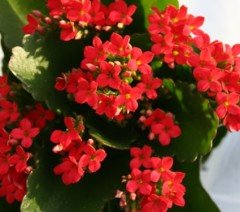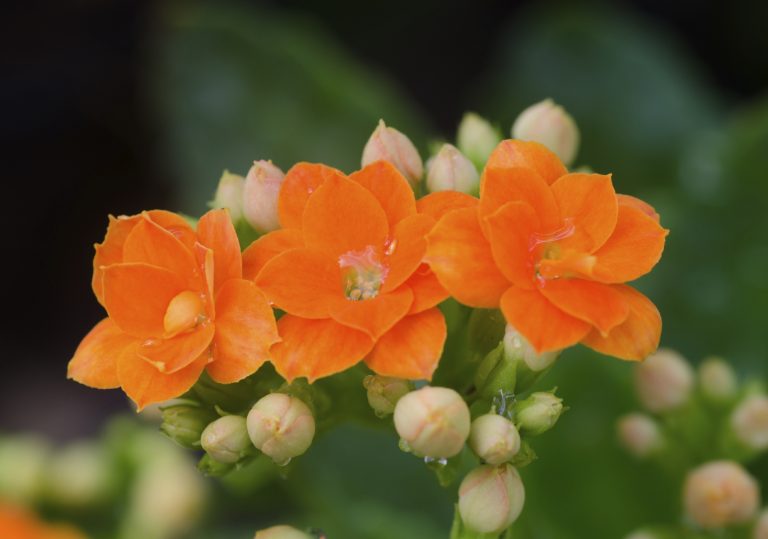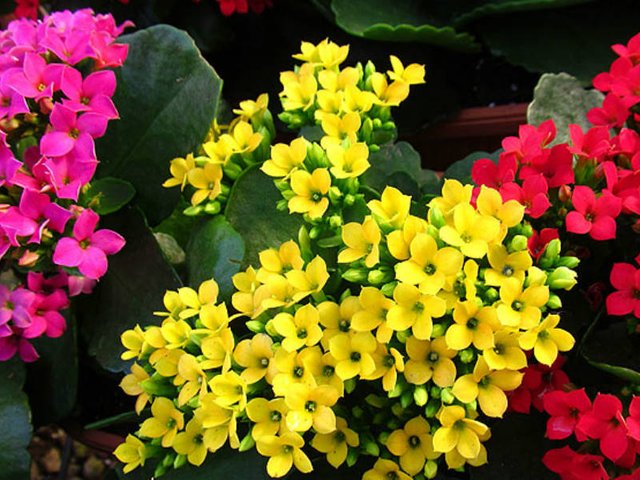Succulent Kalanchoe.
Kalanchoe is from the diverse Crassulaceae Family, which includes popular succulents like the Jade Plant ( a Crassula ) , which is considered by the Chinese to be a good luck charm if you have a plant outside your front door entrance. While the Jade plant is a very tough and attractive plant, it is not as spectacular as the Kalanchoes, which boasts many colourful flowering varieties, sometimes called by their common name 'Widows Thrill".
Succulents are drought tolerant because they hold water within their fleshy leaves, and many plants continue to thrive even though they are neglected. In fact, don't water them too much or you will kill them because the roots will rot off. They are happiest in desert-like conditions- hot and dry. This Kalanchoe plant was in a local garden in Sydney, where it was surrounded by weeds, and next to a dusty building site, but it is still happily flowering away.
Hi, firstly thanks for introducing a new flower. I want to share some information about kalanchoe.



Kalanchoe flower is a beautiful and colorful flower that colors living spaces such as houses, offices and work places. Kalanchoe flower has many kinds and colors in nature. His development is slow and he does not grow too long.
Kalanchoe flower should not be exposed to direct sunlight. It may tend toward the direction of daylight. The direction that does not receive daylight should be turned to daylight at certain intervals. Thus the tendency of the flower to one direction may be prevented.When the leaves are light, they can not be fed as much as they can, and for this flower comes fading and darkening.
Kalanchoe flower should be watered from the top at least twice a week in summer and once a week in winter. The water needs to reach all the soil. Mondays and Thursdays may be preferred in summer irrigation techniques. In winter, Monday days may be preferred for irrigation techniques. The water scale used during irrigation must be the same and water should be poured out in the morning in the morning if the water is poured in the water most of the time in the pot. This will prevent the formation of odor and pests in the soil of the plant. The basic rule in the plant is that the soil of the plant is dry and must be watered, so we can understand that it is dry or wet by sinking the fingers into the soil. If it is wet, we have to leave the irrigation water on the next watering day because the plant has not finished the water in the ground yet.
After the flowers on the leaves of the kalanchio flower have faded away, the foliage should be cut off to prevent the flow of air into the pruned and interrupted region, so that the plant will bloom again. Example: cold silicone can be sealed with non-caustic adhesives on wax.
Thank you for reading..
Silly Sausage award ! I have never heard of using cold silicone , i'm not sure that i understand this. Maybe it's because of the problem with English. I don't really care, but you made me LOL ! And why would you cut the foliage off ?? WTF !! Don't use your breast implants to get more silicone. I like the pics too. Well done !!
Kalanchoe plants are thick leaved succulents that are often seen in florist shops or garden centers. Most end up as potted plants but areas that can mimic their native land of Madagascar can grow them outdoors. The clusters of tiny flowers produce a large bloom held aloft on stems above the majority of the foliage. If you wish a second bloom, it is incumbent to know how to take care of a kalanchoe. These plants need short winter light periods to form new buds. Learn how to grow kalanchoe and the perennial can reward you with several seasons of the bright colorful flowers.
About Kalanchoe Plants
The deep green, scalloped leaves of the kalanchoe are just as attractive as the flowers. The sculpted foliage persists after bloom and provides for a handsome plant. The starry flowers are long lasting and bloom in winter to spring. Kalanchoe plants require well-drained soil and mild temperatures of at least 60 F. (16 C.). Little maintenance is necessary for kalanchoe care and the succulent has few disease or pest problems, especially when grown indoors.
How to Grow Kalanchoe Cuttings
Kalanchoe plants are fun to grow from cuttings. The vegetative stems produce the best plants and root quickest. Take a 2- to 3-inch section and strip off the bottom couple of leaves. Let the cutting sit out in a warm, dry location to form a callus on the end. Plant the cutting in pre-moistened peat and perlite up to the first leaf. Enclose the entire pot in plastic to form a little terrarium and conserve the moisture. Place the pot in a bright window with indirect light. Cuttings will root in 14 to 21 days and are then ready to transplant.
How to Take Care of a Kalanchoe
Plants may grow well in southern Florida year round or outside in USDA zones 8 to 10 during the summer months. Kalanchoe care is minimal but be cautious about light levels. Strong southern light can burn the tips of the leaves. Place pots in partial sun to light shade areas when growing kalachoe plants. The best planting mix is 60 percent peat moss and 40 percent perlite. Cut off spent flower stems and pinch back leggy growth to force a compact plant. Water the plant deeply and then allow it to dry out completely before you give it further moisture. Fertilize once per month during the growing season with a houseplant food.
hey dear sir @ctrl-alt-nwo

its really wonderful article about #Succulent-Kalanchoe plant. looks awesome and great idea. your blog is writing beautiful. so i search on it as per #google.
#Kalanchoe-caring
Kalanchoe plants are thick leaved succulents that are regularly found in flower vendor shops or garden focuses. Most wind up as pruned plants yet zones that can impersonate their local place where there is Madagascar can develop them outside. The bunches of modest blossoms create a substantial sprout held up high on stems over most of the foliage. On the off chance that you wish a moment sprout, it is occupant to know how to deal with a kalanchoe. These plants require short winter light periods to shape new buds. Figure out how to develop kalanchoe and the lasting can remunerate you with a few periods of the brilliant beautiful blooms.
#About-Kalanchoe-Plants

The dark green, scalloped leaves of the kalanchoe are similarly as alluring as the blossoms. The etched foliage continues after sprout and accommodates a great looking plant. The starry blossoms are dependable and sprout in winter to spring. Kalanchoe plants require very much depleted soil and gentle temperatures of no less than 60 F. (16 C.). Little upkeep is fundamental for kalanchoe mind and the succulent has few sickness or bug issues, particularly when developed inside.
How to Grow Kalanchoe Cuttings
Kalanchoe plants are amusing to develop from cuttings. The vegetative stems create the best plants and root snappiest. Take a 2-to 3-inch segment and strip off the base couple of clears out. Give the slicing a chance to sit out in a warm, dry area to shape a callus on the end. Plant the cutting in pre-soaked peat and perlite up to the primary leaf. Encase the whole pot in plastic to shape a little terrarium and monitor the dampness. Place the pot in a splendid window with circuitous light. Cuttings will establish in 14 to 21 days and are then prepared to transplant.

How To Grow Kalanchoe Plants
Plants may develop well in southern Florida year round or outside in USDA zones 8 to 10 amid the late spring months. Kalanchoe mind is negligible yet be wary about light levels. Solid southern light can consume the tips of the clears out. Place pots in incomplete sun to light shade territories when developing kalachoe plants. The best planting blend is 60 percent peat greenery and 40 percent perlite. Cut off spent bloom stems and squeeze back leggy development to drive a reduced plant. Water the plant profoundly and after that enable it to dry out totally before you give it facilitate dampness. Prepare once every month amid the developing season with a houseplant nourishment.

Kalanchoe Care for Second Bloom
Despite the fact that the plant foliage of developing kalanchoe succulent plants is fascinating even without sprouts, the blossoms make the most astounding presentation. To constrain the plant to blossom once more, you should trick it into trusting it has encountered winter. Amid October and early March, the day lengths are sufficiently short to normally constrain bloom buds. In different periods, you should put the plant in a wardrobe or diminish space for the greater part of the day. Bring it out just to morning light and after that put it away following a couple of hours. The plant needs a month and a half of 12 to 14 hour obscurity to shape terrific new blooms. The best temperatures for arrangement of blossoms are 40-45 F. (4-7 C.) around evening time and 60 F. (16 C.) amid the day. Kalanchoe administer to plants that have started to shape buds is the same as that for blooming plants.

Hope like my stuff whereas you are already reward me on 1st position of your last blogs but this time i am late due busy in my job activity on last date on monthly closing.
stay blessed and steem on
Thanks for appreciation